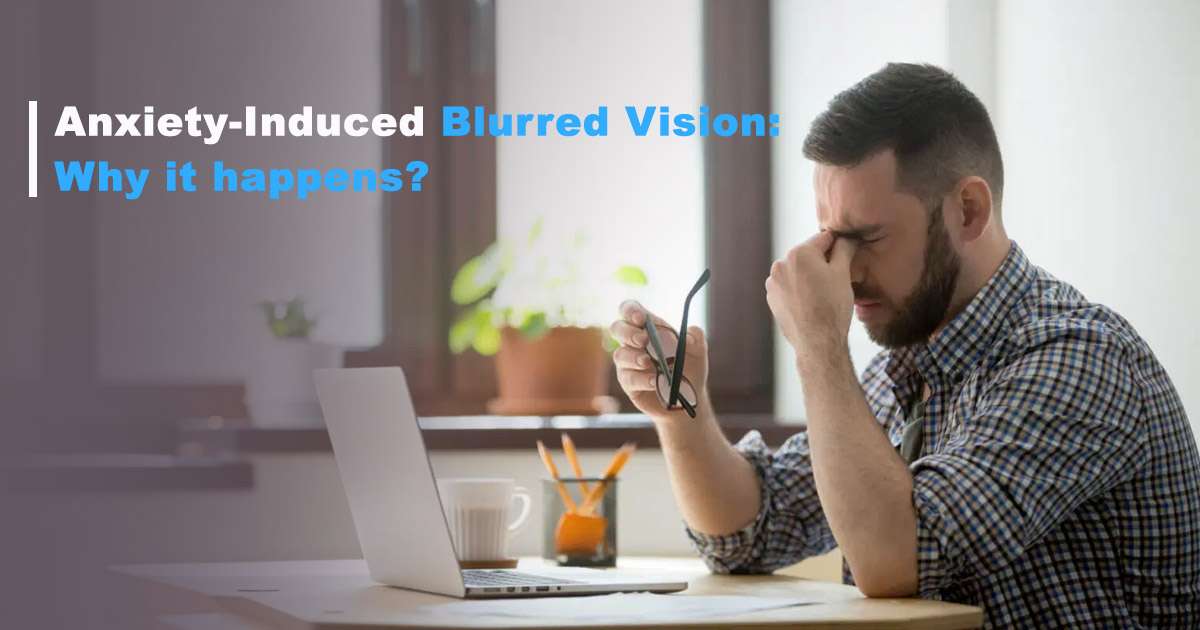How Anxiety Can Blur Your Vision

When you’re stressed or anxious, it can mess with your vision. Your body releases stress hormones like cortisol and adrenaline, which can affect how well you see. So, when you’re really anxious or having a panic attack, your vision might get blurry for a bit, making it hard to see properly.
Why does this happen?
When you’re anxious, your body reacts in different ways, which can affect your vision. Stress hormones can make the blood vessels around your eyes tighten, reducing oxygen and nutrients reaching them. Also, the muscles around your eyes might tense up, making it hard to focus properly. So, when you’re feeling stressed or anxious, these changes can sometimes cause your vision to get blurry sometimes.
How would I know if this is not caused by an illness?
It’s important to distinguish blurry vision caused by anxiety from vision problems linked to other health issues. Here’s how you can figure out if your blurry vision is due to anxiety or something else:
- Pay Attention to Timing: Notice when your blurry vision happens. If it occurs when you’re feeling stressed or anxious and gets better when you calm down, it’s likely related to your emotions. Anxiety-induced blurry vision often comes and goes, depending on your stress levels.
- Look for Other Signs: See if your blurry vision comes with other anxiety symptoms like a fast heartbeat, sweating, or shaking. These physical signs of anxiety can help you understand why your vision is blurry.
- Check if It Stays: If your vision stays blurry or gets worse even when you’re not feeling anxious, it’s best to see a doctor. Blurry vision that doesn’t improve with relaxation techniques might indicate another health issue.
- Consider Other Causes: Blurry vision can also be a sign of different health problems not related to anxiety, such as eye diseases or neurological conditions. These include things like nearsightedness, glaucoma, migraines, or diabetes.
- Get Checked: Visit a healthcare professional, such as an eye doctor or your primary care physician, for a thorough evaluation. They can thoroughly check your eyes and evaluate your medical history to determine the cause of your blurred vision. Depending on your situation, they may recommend testing to acquire a better understanding of your eye health.
Will this go away naturally?
For many people, blurry vision caused by anxiety often goes away by itself when the stress or anxiety goes down. As your body calms down and you start to feel better emotionally, you might notice that your vision clears up without needing any specific treatment.
But how long this blurry vision lasts can vary from person to person. It depends on things like how severe your anxiety is, how healthy you are overall, and what methods you use to manage stress. Sometimes, the blurry vision might stick around for a while or keep coming back, especially if the underlying anxiety or stress isn’t dealt with.
It’s important to keep an eye on your symptoms and see how your vision changes over time. If your blurry vision doesn’t get better or gets worse even after trying to manage your anxiety and stress, you might need extra help or treatment.
While some people might see their blurry vision get better on its own, others might find it helpful to try therapy, medication, or lifestyle changes to tackle their anxiety and its symptoms more effectively.
What can I do to treat anxiety-induced blurred vision?
To ease anxiety-induced blurry vision, try these simple steps:
- Relaxation Techniques: Practice calming exercises like deep breathing or mindfulness meditation daily. These help soothe your mind and body, reducing stress and easing blurry vision caused by anxiety.
- Screen Breaks: Take frequent breaks from screens to relax your eyes. Follow the 20-20-20 rule, which states that every 20 minutes, glance at something 20 feet away for 20 seconds. It reduces eye strain and blurred vision caused by excessive screen usage.
- Stay Hydrated: Drink plenty of water throughout the day to keep your body and eyes hydrated. Good hydration promotes eye health and alleviates the discomfort of anxiety-related blurred vision.
- Quality Sleep: Aim for 7-9 hours of unbroken sleep per night to help control anxiety. Maintain a consistent sleep schedule and establish a calming nighttime ritual to improve sleep quality and prevent hazy vision.
- Therapy Support: Talking to a therapist can be beneficial. They can help identify triggers, teach coping strategies, and relaxation techniques to manage stress, and reduce blurry vision caused by anxiety.
When do I see a doctor?
If blurry vision doesn’t get better with self-care, see a doctor. An eye specialist can check for any eye problems or health issues causing blurry vision. They’ll give advice on managing anxiety-related blurry vision and keeping your eyes healthy.
The relationship between anxiety and blurred vision
Blurred vision from anxiety is pretty normal when stress levels spike. But you can tackle it! Understand how anxiety and blurry vision are connected, and try stress-busting techniques to ease the tension. Taking care of yourself, seeking support, and getting help from a pro if needed can all make a big difference. Don’t let blurry vision bring you down – with the right moves, you can see clearly again, even when anxiety is around.

